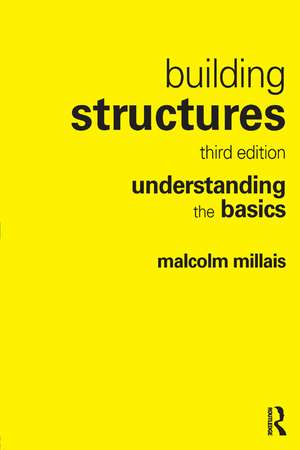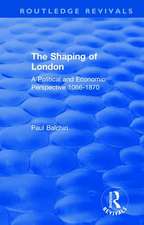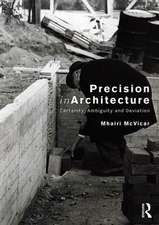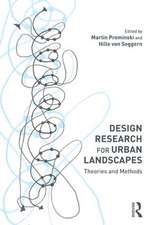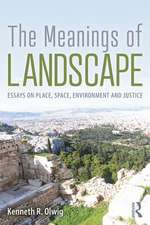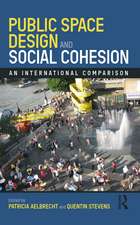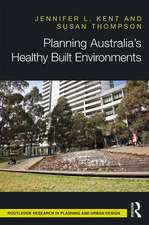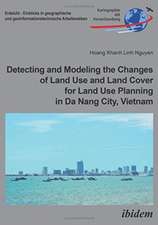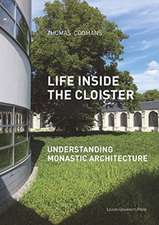Building Structures: understanding the basics
Autor Malcolm Millaisen Limba Engleză Hardback – 21 iun 2017
- follow the history of structural understanding;
- grasp the concepts of structural behaviour via step-by-step explanations;
- apply these concepts to a simple building;
- see how these concepts apply to real buildings, from Durham Cathedral to the Bank of China;
- use these concepts to define the design process;
- see how these concepts inform design choices;
- understand how engineering and architecture have diverged, and what effect this had;
- learn to do simple but relevant numerical calculations for actual structures;
- understand when dynamics are important;
- follow the development of progressive collapse prevention;
- enter the world of modern structural theory;
- see how computers can be used for structural analysis;
- learn how to organise and design a successful project.
| Toate formatele și edițiile | Preț | Express |
|---|---|---|
| Paperback (1) | 395.08 lei 22-36 zile | +52.91 lei 6-12 zile |
| Taylor & Francis – 14 iun 2017 | 395.08 lei 22-36 zile | +52.91 lei 6-12 zile |
| Hardback (1) | 1033.10 lei 43-57 zile | |
| Taylor & Francis – 21 iun 2017 | 1033.10 lei 43-57 zile |
Preț: 1033.10 lei
Preț vechi: 1377.33 lei
-25% Nou
Puncte Express: 1550
Preț estimativ în valută:
197.75€ • 214.87$ • 166.21£
197.75€ • 214.87$ • 166.21£
Carte tipărită la comandă
Livrare economică 21 aprilie-05 mai
Preluare comenzi: 021 569.72.76
Specificații
ISBN-13: 9781138119741
ISBN-10: 1138119741
Pagini: 578
Ilustrații: 1232
Dimensiuni: 174 x 246 mm
Greutate: 1.47 kg
Ediția:3
Editura: Taylor & Francis
Colecția Routledge
Locul publicării:Oxford, United Kingdom
ISBN-10: 1138119741
Pagini: 578
Ilustrații: 1232
Dimensiuni: 174 x 246 mm
Greutate: 1.47 kg
Ediția:3
Editura: Taylor & Francis
Colecția Routledge
Locul publicării:Oxford, United Kingdom
Public țintă
Postgraduate, Professional, and UndergraduateCuprins
Preface to the Third Edition. Introduction. 1. Loads and load paths. 2. Internal forces. 3. Structural element behaviour. 4. Advanced concepts of stress. 5. Structural materials. 6. Safe structures and failure. 7. Geometry and structural behaviour. 8. Below-ground structures. 9. Behaviour of a simple building. 10. Real structures. 11. Structural conception. 12. Structures and built form. 13. Structures in Existing Buildings. 14. A simple approach to calculations. 15. Dynamic Behaviour. 16. Progressive collapse and robustness. 17. The mathematical basis. 18. The basis for computer calculations. 19. The successful structural project. Further Reading. Index.
Notă biografică
Malcolm Millais is a structural engineer.
Recenzii
"To conclude, I would recommend students and professional colleagues to read this accessible, well-illustrated book on both the fundamentals and greater complexities of structural performance. Well worth the read!"
Michael Dickson, The Structural Engineer, April 2018
"This very broad book does a marvellous job of drawing the reader into the world of structural engineering – from seemingly simple concepts to increasingly complex issues. It deserves a place on any architect’s or engineer’s bookshelf."
Review in Civil Engineering, Volume 171, November 2018
Reviews of the 2nd edition
‘I give this book my highest commendation’ The Structural Engineer
‘How I wish that when presented with the theory of structures Millais’ book had been available’ Professor Derek Sugden in the Architect’s Journal
‘This book has changed my thinking on the subject and made me a better engineer’ Amazon reviewer
‘If architects could be fluent in the basic language of this book, then the design of structures for tomorrow’s architecture would benefit immensely’ Ian Duncan in Structures and Buildings
about the 3rd edition Michael Dickson FREngFIStructE Hon FRIBA, Founding Partner of Buro Happold and Visiting Professor of Engineering Design at Bath University writes:
‘The new chapters of the 3rd edition build on the successful 2nd edition. Clear explanations, well supported by illustrations, cover engineering in the ground, robustness against progressive collapse and dynamic response to earthquake and extreme loading. A new chapter discusses the difference between structural design of a new structure and that for alterations or strengthening an existing one. I would strongly recommend my students to study this accessible 3rd edition as it offers a clear view of structural performance across a wide range of issues.’
Professor Wanda Lewis writes:
'The scope of the third edition of the book is huge: not only does it cover the fundamentals of structural action with reference to real projects, but engages in fascinating forensic engineering, particularly in the new chapter on dynamic that covers progressive collapse. Illustrated with beautiful, hand-drawn diagrams, the book often highlights conflicts between designs led by architectural vision and sound engineering principles. The author reflects on the fact that honours for outstanding designs tend to go to architects, with engineering achievements receiving much less publicity. It is pleasing to see interesting historical facts and references to previous noted work by famous architects, scientists and engineers- something that is missing in most engineering textbooks. Building Structures, third edition, is thought provoking and highly educational; it should be an essential reading for students and practitioners of the built environment in any country.'
"This very broad book does a marvellous job of drawing the reader into the world of structural engineering – from seemingly simple concepts to increasingly complex issues. It deserves a place on any architect’s or engineer’s bookshelf."
Review in Civil Engineering, Volume 171, November 2018
Michael Dickson, The Structural Engineer, April 2018
"This very broad book does a marvellous job of drawing the reader into the world of structural engineering – from seemingly simple concepts to increasingly complex issues. It deserves a place on any architect’s or engineer’s bookshelf."
Review in Civil Engineering, Volume 171, November 2018
Reviews of the 2nd edition
‘I give this book my highest commendation’ The Structural Engineer
‘How I wish that when presented with the theory of structures Millais’ book had been available’ Professor Derek Sugden in the Architect’s Journal
‘This book has changed my thinking on the subject and made me a better engineer’ Amazon reviewer
‘If architects could be fluent in the basic language of this book, then the design of structures for tomorrow’s architecture would benefit immensely’ Ian Duncan in Structures and Buildings
about the 3rd edition Michael Dickson FREngFIStructE Hon FRIBA, Founding Partner of Buro Happold and Visiting Professor of Engineering Design at Bath University writes:
‘The new chapters of the 3rd edition build on the successful 2nd edition. Clear explanations, well supported by illustrations, cover engineering in the ground, robustness against progressive collapse and dynamic response to earthquake and extreme loading. A new chapter discusses the difference between structural design of a new structure and that for alterations or strengthening an existing one. I would strongly recommend my students to study this accessible 3rd edition as it offers a clear view of structural performance across a wide range of issues.’
Professor Wanda Lewis writes:
'The scope of the third edition of the book is huge: not only does it cover the fundamentals of structural action with reference to real projects, but engages in fascinating forensic engineering, particularly in the new chapter on dynamic that covers progressive collapse. Illustrated with beautiful, hand-drawn diagrams, the book often highlights conflicts between designs led by architectural vision and sound engineering principles. The author reflects on the fact that honours for outstanding designs tend to go to architects, with engineering achievements receiving much less publicity. It is pleasing to see interesting historical facts and references to previous noted work by famous architects, scientists and engineers- something that is missing in most engineering textbooks. Building Structures, third edition, is thought provoking and highly educational; it should be an essential reading for students and practitioners of the built environment in any country.'
"This very broad book does a marvellous job of drawing the reader into the world of structural engineering – from seemingly simple concepts to increasingly complex issues. It deserves a place on any architect’s or engineer’s bookshelf."
Review in Civil Engineering, Volume 171, November 2018
Descriere
This is a one-stop book for knowing everything important about building structures. Self-contained and with no prerequisites needed, it is suitable for both general readers and building professionals.
